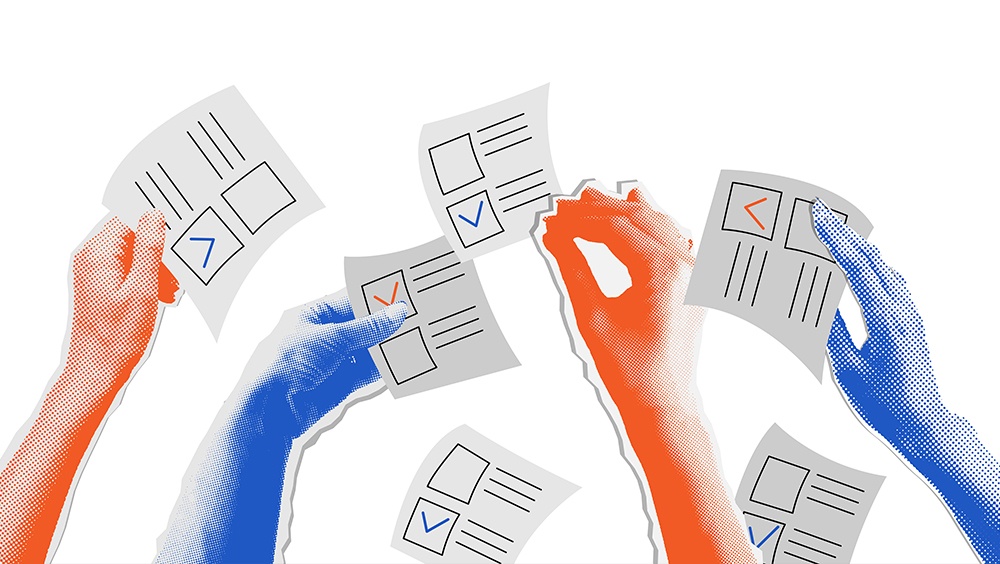Perspective: Why Voting Is the Ultimate Expression of First Amendment Rights

You will not find a "right to vote in elections" mentioned in the 45 words of the First Amendment, or elsewhere in the U.S. Constitution for that matter.
But voting is the ultimate expression of those core freedoms, the most empowering means available to citizens aiming to participate in the political and self-governing tasks of a democratic republic.
Voting rights are based on and protected by a national patchwork of state constitutions and statutes and court decisions. The right to vote is implied in multiple U.S. constitutional amendments.
Forty-nine of the 50 state constitutions explicitly affirm the right to vote. The exception is Kansas, where its state Supreme Court declared in June 2024 that no such provision exists.
What is meant by voting is "the ultimate expression of First Amendment rights?"
The nation's founders provided strong protections for our core freedoms: religion, speech, press, assembly and petition.
Religious liberty protects us as we determine our personal values, through faith or other reasoning. We can then speak and write about those values to others. If enough fellow citizens agree, we have a right to organize – assemble – and to "petition the government for a redress of grievances."
Since there is no law forcing the government to act once we speak (either as individuals or as a group), the engagement could stop there – except for the power of the ballot.
What makes up the "patchwork" of laws that protect voting for federal offices?
The U.S. Constitution says that a person eligible to vote for the largest house of a state's legislature is also eligible to vote for members of the U.S. House of Representatives from that state.
In 1868, the 14th Amendment extended citizenship to all natural born or naturalized Americans regardless of race. It guaranteed that states cannot restrict the rights of citizenship, like voting.
In 1870, the 15th Amendment prohibited restricting the right to vote due to race. That same year, the Enforcement Act (also known as the Ku Klux Klan Act) made it illegal to disenfranchise Black voters through discriminatory laws or criminal actions. It allowed the president to use federal marshals to bring charges against offenders.
The 17th Amendment, adopted in 1913, required states to elect senators by popular vote, rather than through electors.
The 19th Amendment, adopted in 1920, gave all women the right to vote. In 1964, the 24th Amendment barred poll taxes, which had the effect of excluding people with low income in many states from voting. In 1971, the 26th Amendment lowered the voting age from 21 to 18 years old.
And in 1965, the Voting Rights Act empowered federal officials to challenge state laws that were aimed at excluding minority voters. But in 2013, in Shelby County v. Holder, the U.S. Supreme Court weakened the law by declaring much of its enforcement and monitoring provisions to be unconstitutional.
Can the government restrict First Amendment freedoms related to voting?
Since 2020, several states have adopted new restrictions on registration of voters and higher fines for violations. The restrictions focused on private groups that work to register voters and help people get to voting locations. Those groups have argued that the laws chilled their rights to free speech and assembly.
On the other side, there are laws punishing false speech with intent to prevent people from voting. The originator of a robocall that told thousands of New Hampshire residents not to vote in that state's primary election in January 2024 was fined $6 million by the Federal Communications Commission and faces multiple criminal charges related to voter suppression and impersonating a political candidate.
States and local governments may restrict certain kinds of expressive speech and conduct where voting is involved.
RELATED: When, where and how political signs can be restricted
As of September 2024, the National Conference of State Legislatures reported limits on nearby activities when polling places are open for registration or voting:
- 21 states prohibit campaign apparel, buttons, stickers and placards.
- 38 states and Washington, D.C., prohibit campaign materials, signs, banners and literature.
- 29 states prohibit influencing voters, soliciting votes and political persuasion, with a few states now banning even nonpartisan groups from providing water to voters standing in long lines.
- 18 states and Washington, D.C., prohibit circulating petitions and soliciting signatures.
One more kind of restriction often seen as government control of activities related to voting is that of the private agreements signed as part of homeowner association memberships. Those agreements can ban or limit political yard signs, and windows, outside wall or fence displays that otherwise would be protected political speech. But that's not a First Amendment item; those are contracts between the associations and the homeowners or property owners.
Gene Policinski is a senior fellow for the First Amendment at Freedom Forum. He can be reached at gpolicinski@freedomforum.org.
Five 1A Questions With New Freedom Forum Fellow Ashkhen Kazaryan
Is the TikTok Law a Violation of the First Amendment?
Related Content

